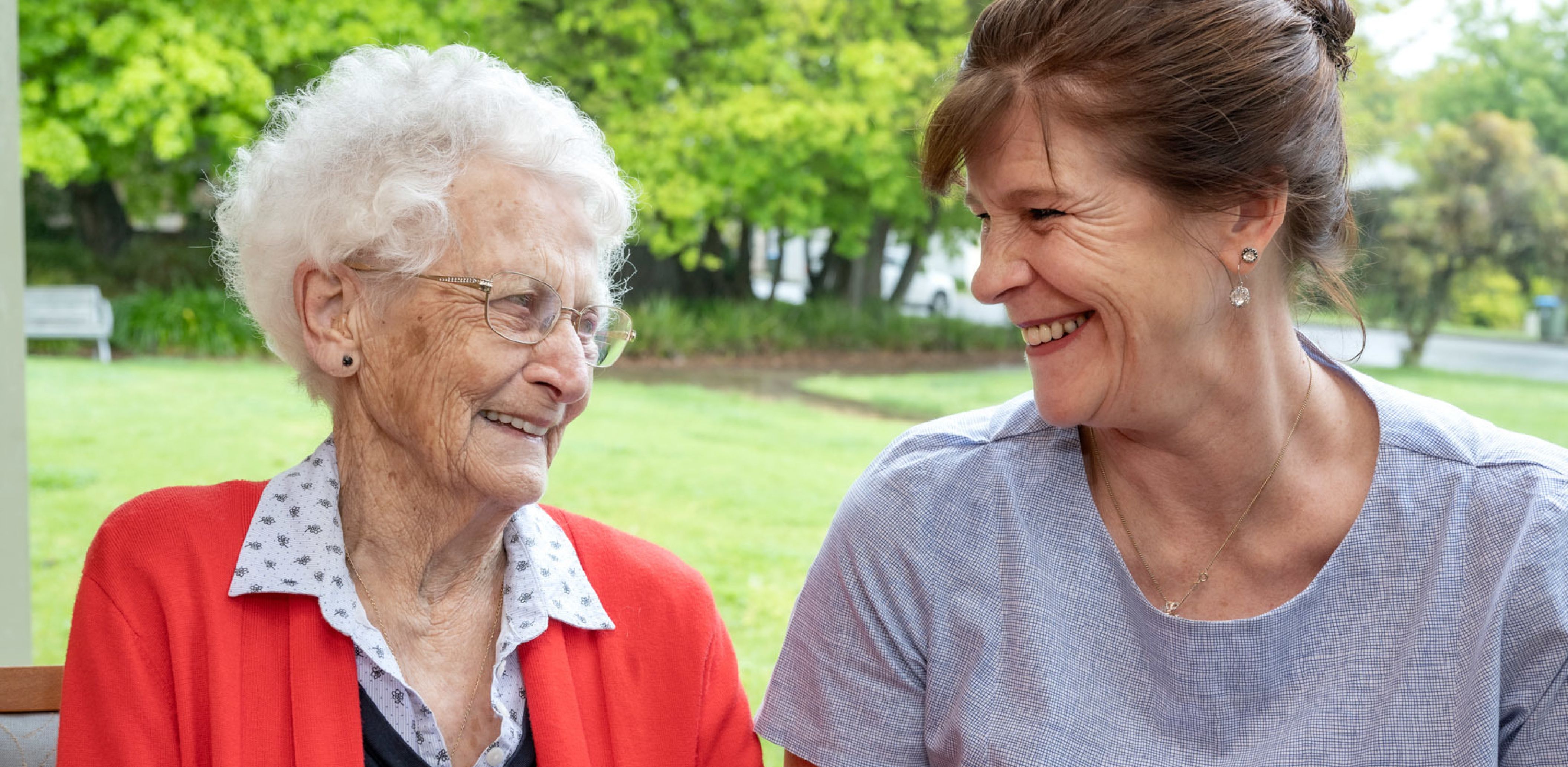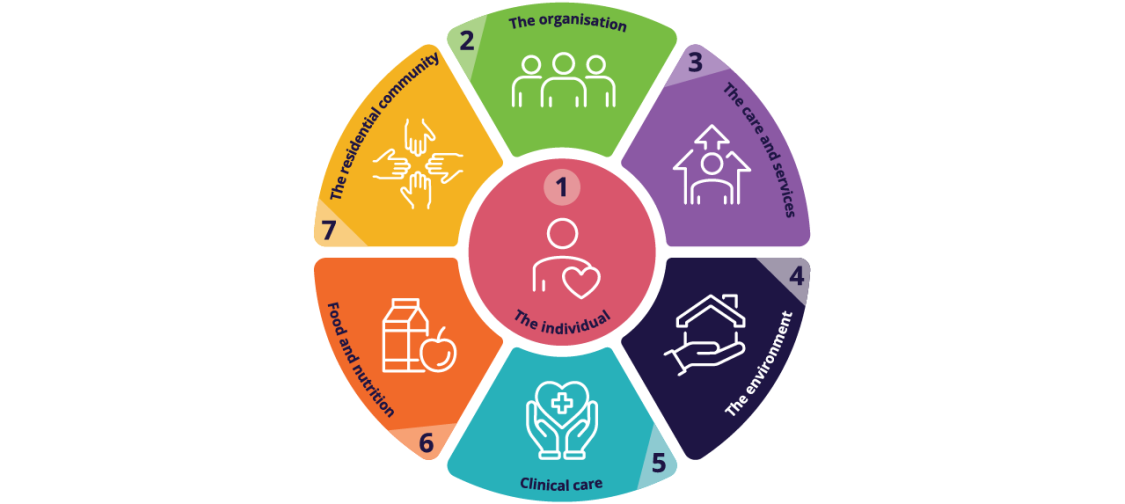Aged care registration and standards
Eldercare’s residential care homes are regulated by the Aged Care Quality and Safety Commission (the Commission) which assesses the standard of care and services provided by Eldercare.
The Commission assesses and monitors Eldercare (and all other aged care providers) against seven Aged Care Quality Standards (effective 1 November 2025) to ensure residents and clients receive high quality care.
The Standards include expectation statements for older people that set out what people can expect from aged care providers:
Standard 1 – The Person
I have the right to be treated with dignity and respect and to live free from any form of discrimination. I make decisions about my funded aged care services, with support when I want or need it. My identity, culture and diversity are valued and supported, and I have the right to live the life I choose. My provider understands who I am and what is important to me, and this determines the way my funded aged care services are delivered
Standard 2 – The Organisation
The organisation is well run. I can contribute to improvements to care and services. My provider and aged care workers listen and respond to my feedback and concerns. I receive funded aged care services from aged care workers who are knowledgeable, competent, capable and caring.
Standard 3 – The Care and Services
The funded aged care services I receive:
• are safe and effective
• optimise my quality of life, including through maximising independence and reablement meet my current needs, goals and preferences
• are well planned and coordinated
• respect my right to take risks.
Standard 4 – The Environment
I feel safe when receiving funded aged care services. Where I receive funded aged care services through a service environment, the environment is clean, safe and comfortable and enables me to move around freely. Equipment is safe, appropriate and well-maintained and precautions are taken to prevent the spread of infections.
Standard 5 – Clinical Care
I receive person-centred, evidence-based, safe, effective, and coordinated clinical care services by health professionals and competent aged care workers that meets my changing clinical needs and is in line with my goals and preferences.
Standard 6 – Food and Nutrition
I receive plenty of food and drinks that I enjoy. Food and drinks are nutritious, appetising and safe, and meet my needs and preferences. The dining experience is enjoyable, includes variety and supports a sense of belonging.
Standard 7 – The Residential Community
I am supported to do the things I want and to maintain my relationships and connections with my community. I am confident in the continuity of my care and security of my accommodation.
The Commission's Aged Care Quality Standards website outlines these statements and requirements in more detail.
Eldercare is committed to providing services that meet the standards and provides an environment where consumers are supported to plan their care and services, with our staff, to meet their spiritual, social, emotional and physical needs.
Disclaimer: The use of images and videos contained herein does not constitute an endorsement by the Aged Care Quality and Safety Commission of Eldercare’s activities.
Your aged care rights
You and your representative have a series of rights that apply when you start receiving government-subsidised aged care services.
These rights are outlined in the Statement of Rights, which are contained within the Aged Care Act 2024.
Eldercare has incorporated these rights into the way we operate our services.
Statement of Rights
Independence, autonomy, empowerment and freedom of choice
(1) An individual has a right to:
(a) exercise choice and make decisions that affect the individual's life, including in relation to the following:
(i) the funded aged care services the individual has been approved to access;
(ii) how, when and by whom those services are delivered to the individual;
(iii) the individual's financial affairs and personal possessions; and
(b) be supported (if necessary) to make those decisions, and have those decisions respected; and
(c) take personal risks, including in pursuit of the individual's quality of life, social participation and intimate and sexual relationships.
Equitable access
(2) An individual has a right to equitable access to:
(a) have the individual's need for funded aged care services assessed, or reassessed, in a manner which is:
(i) culturally safe, culturally appropriate, trauma-aware and healing-informed; and
(ii) accessible and suitable for individuals living with dementia or other cognitive impairment; and
(b) palliative care and end-of-life care when required.
(3) An individual has a right to:
(a) be treated with dignity and respect; and
(b) safe, fair, equitable and non-discriminatory treatment; and
(c) have the individual's identity, culture, spirituality and diversity valued and supported; and
(d) funded aged care services being delivered to the individual:
(i) in a way that is culturally safe, culturally appropriate, trauma-aware and healing-informed; and
(ii) in an accessible manner; and
(iii) by aged care workers of registered providers who have appropriate qualifications, skills and experience
(4) An individual has a right to:
(a) be free from all forms of violence, degrading or inhumane treatment, exploitation, neglect, coercion, abuse or sexual misconduct; and
(b) have quality and safe funded aged care services delivered consistently with the requirements imposed on registered providers under this Act.
Respect for privacy and information
(5) An individual has a right to have the individual's:
(a) personal privacy respected; and
(b) personal information protected.
(6) An individual has a right to seek, and be provided with, records and information about the individual's rights under this section and the funded aged care services the individual accesses, including the costs of those services.
Person-centred communication and ability to raise issues without reprisal
(7) An individual has a right to:
(a) be informed, in a way the individual understands, about the funded aged care services the individual accesses; and
(b) express opinions about the funded aged care services the individual accesses and be heard.
(8) An individual has a right to communicate in the individual's preferred language or method of communication, with access to interpreters and communication aids as required.
(9) An individual has a right to:
(a) open communication and support from registered providers when issues arise in the delivery of funded aged care services; and
(b) make complaints using an accessible mechanism, without fear of reprisal, about the delivery of funded aged care services to the individual; and
(c) have the individual's complaints dealt with fairly and promptly
Advocates, significant persons and social connections
(10) An individual has a right to be supported by an advocate or other person of the individual's choice, including when exercising or seeking to understand the individual's rights in this section, voicing the individual's opinions, making decisions that affect the individual's life and making complaints or giving feedback.
(11) An individual has a right to have the role of persons who are significant to the individual, including carers, visitors and volunteers, be acknowledged and respected.
(12) An individual has a right to opportunities, and assistance, to stay connected (if the individual so chooses) with:
(a) significant persons in the individual's life and pets, including through safe visitation by family members, friends, volunteers or other visitors where the individual lives and visits to family members or friends; and
(b) the individual's community, including by participating in public life and leisure, cultural, spiritual and lifestyle activities; and
(c) if the individual is an Aboriginal or Torres Strait Islander person—community, Country and Island Home
(13) An individual has a right to access, at any time the individual chooses, a person designated by the individual, or a person designated by an appropriate authority

